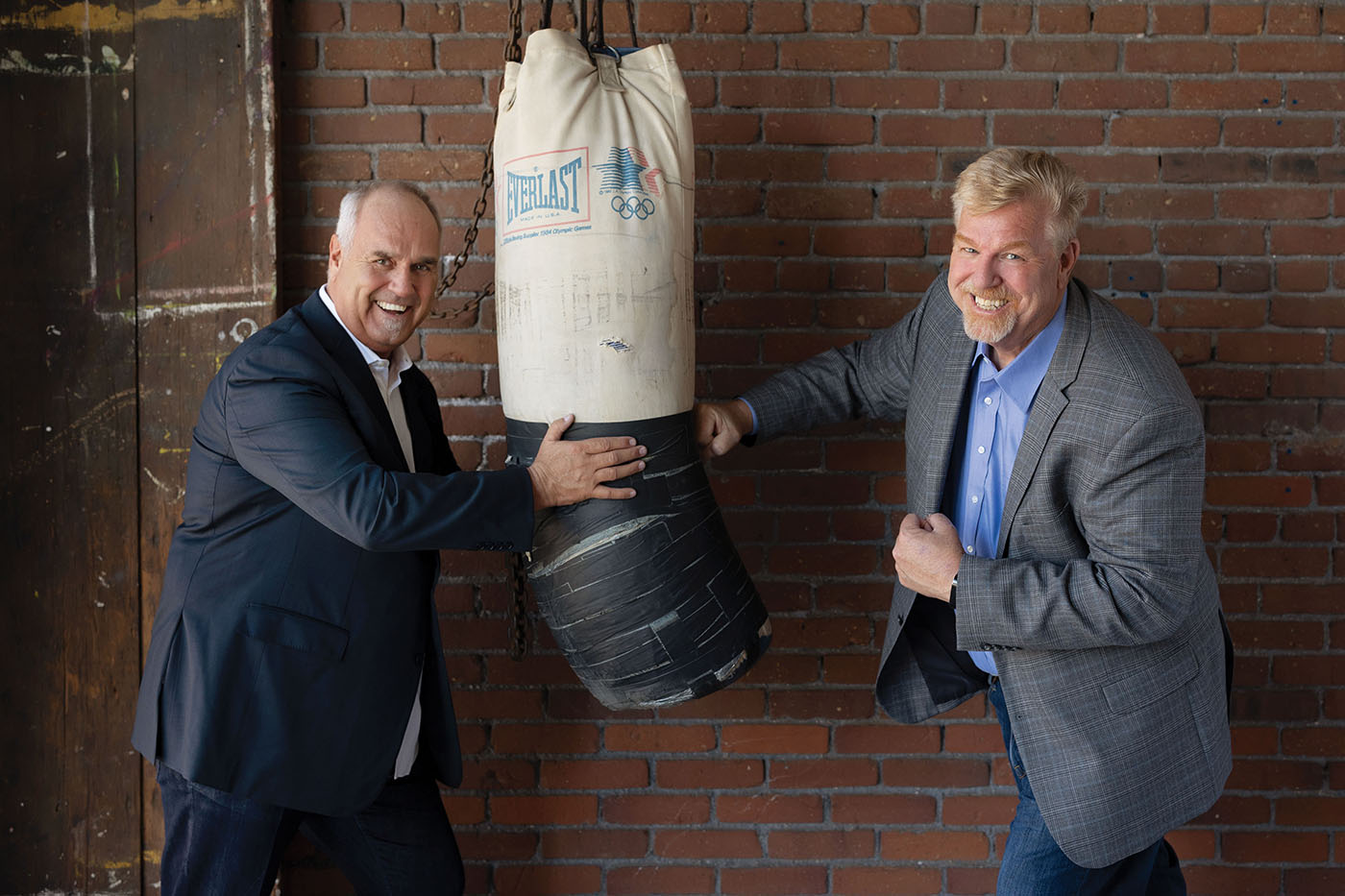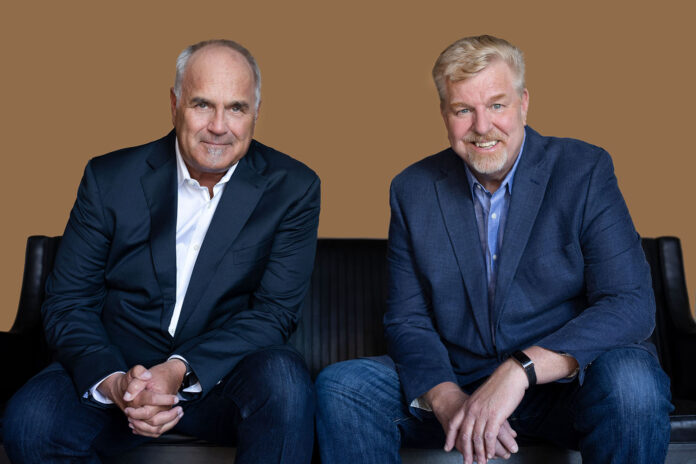While most of the industry sees the looming landmark of federal legalization as the moment the market’s potential will be unleashed, those with a deeper read on the capital markets often note banking reform will be the real catalyst for transformation.
Advocates for passing the Secure and Fair Enforcement (SAFE) Banking Act invariably reference the private-equity money “locked up” on the sidelines. As they tell it, investors are itching to get in on the high-growth cannabis industry, but only after the industry is legitimized with the vital banking step.
It’s at this moment Bob Thomas and Jim Snow, cofounders of Vertical Cannabis Partners (VCP), aim to become the most sought-after men in the industry. The seasoned hospitality and fitness consultants have enjoyed long and storied careers working on both the buyer and seller side of private-equity deals, focusing on operational and sales consulting and supporting mergers and acquisitions predominantly within the fitness space. Their company looks to bring a similar suite of services to the burgeoning cannabis industry, helping it prepare for what some may consider a jarring change: an influx of institutional capital coupled with a new class of corporate executives tasked with improving operations and efficiencies in a notoriously chaotic industry.
“You’d be surprised at the similarities between the early days of the fitness industry and the cannabis industry,” said Snow, whose stints as president of the iconic Gold’s Gym (2009–2013) and Private Equity Performance Group (current) earned him a reputation as something of a turnaround guy. “The first decade of the fitness industry was wide open with young entrepreneurs who had the passion and the animal spirit to dive into the unknown with money raised from family and friends to open clubs. Then came the more sophisticated, larger institutional operators that stepped in and built quality operations with strong brands.”
As Thomas and Snow tell it, private equity’s interest in gyms in the early 1990s was the catalyst for professionalization in the fitness industry and birthed the gym chains like Gold’s, LA Fitness, and 24 Hour Fitness that dominate the market today. The pair is betting cannabis will follow a similar pattern once the curtain finally falls on the era of banking uncertainty. They see a considerable opportunity to support private-equity groups as they revitalize distressed dispensaries or work with mom-and-pop operators to prepare them for the rigorous process of courting a buyout.
“Make no mistake,” Snow cautioned, “private-equity companies and the like are coming for you, whether you are a single operator or have ten stores. The difference will be whether they are willing to buy you at a nice multiple or just put you out of business.”
Vertical Cannabis Partners, which launched in 2019, is a network of experienced operators and consultancy groups that bring extensive expertise to every aspect of the supply chain. Thomas and Snow themselves work to improve aspects like tactical and strategic leadership, business processes, revenue generation, expense reduction, and net profit increases, while their strategic partners execute in specialty areas like dispensary tenant improvements or product distribution.
One aspect of their business that has gained significant traction of late is a lending program that offers low-interest loans at 5 to 7 percent via a strategic partner. While the loans can be used for all manner of business improvements, having access to low-cost capital before the private-equity groups enter the space can enable operators to begin the often extensive capital expenditure needed to maximize their multiples.
“Our new lending program really is a diamond in the rough,” said Thomas. “It’s not for everyone, but for those who do qualify, this program is a game-changer. It is intended to be a market disruptor and, frankly, is a phenomenal opportunity given how tough and expensive lending in the cannabis industry typically is.”
mg Magazine spoke to Thomas and Snow about their experience building national fitness and hospitality chains and turning around struggling businesses. Based on similarities they see between those industries and cannabis, they envision a similar evolutionary process when a new influx of capital sparks a renewed green rush.

What did your careers look like before you established Vertical Cannabis Partners?
Thomas: I started my career at a country club/fine dining company in Dallas that had a fitness division. I was there for about ten years and, in that time, I noticed there was no recurring revenue model for gyms. If you went to a gym back then, you’d pay for a day pass, week pass, three-month pass, six-month pass, or one-year pass. I came up with a process for billing a credit card or checking account to create a recurring model and started a company called Sports and Fitness to offer that service. Back in 1989, nobody knew what the heck I was talking about. But over time, the clients started coming in, and after about ten years, Sports and Fitness morphed into an acquisition company that then was bought by 24 Hour Fitness.
From there I went on to Lifetime Fitness, which was a small boutique operator in Minneapolis, and I was one of the executives who helped to scale the brand from five locations to more than 100 nationally. I left in 2009 and since then have been a consultant to a variety of fitness companies—and more recently, cannabis companies.
Snow: I spent most of my career with Omni Hotels, where I became known as the turnaround guy. We would go in and buy a property or take a property that was in a desperate situation, and I’d spend two to three years reorganizing things. I’d create a new revenue stream here, fix a service there, improve the product quality, and then ultimately move on to another property.
After doing this for a while, I joined Gold’s Gym as the president of the company, which at the time had 500 clubs in thirty or so countries and forty-four states. It was in need of a pretty big turnaround. It was struggling to achieve any of the goals that had been set out for the organization. I did that for three years, learned the franchise business, learned the retail business, built a ton of clubs, and did about $100 million or so of acquisitions. After that, I joined Marriott Hotels as a general manager for six years, overseeing all operational aspects of the Westin and Sheraton Hotel Complex at Crown Center in Kansas City.
What prompted the transition to cannabis?
-

Bob Thomas
Thomas: I ran into the Gold Flora folks out in Desert Hot Springs about three and a half years ago, and they were building a 700,000-square-foot cannabis campus. They kind of brought me in, and I started doing some development work. From there I was introduced to some groups up in the Emerald Triangle, where I got to learn about the medicinal side of things and started to see the through lines between cannabis and the health-and-wellness work I’d been doing for most of my career. It was there I said, “All right, I can see myself in this industry, but let’s see where I fit in,” because as you know, the traditional business space doesn’t really match up with the cannabis space directly. The challenge for us was not coming across as these oddball corporate guys who smelled an opportunity. We really committed to immersing ourselves in the industry and bringing value to it. When I was able to wrap my arms around the vernacular and could communicate in this space, that was probably the big “aha” moment for me.
Snow: It was around that time Bob called me up with grand visions of the cannabis industry. He convinced me to retire from hospitality and join him to consult on a variety of projects within cannabis. What convinced me were the similarities Bob had identified with the early days of the fitness industry. Being a business coach and having a long corporate career, I felt like I could contribute something and make a difference to these folks’ businesses.
Thomas: Growth through consolidation is key right now, and I think the timing is perfect for us as a team. The industry needs experienced management and operations consultants, and it is embracing us because of all the regulations, the compliance, all the stuff you need but the companies often just don’t have the tools or the know-how to execute on because they’ve been in the illicit market for so many years.
What specific similarities do you see between the cannabis industry and the early days of the fitness industry?
Thomas: The cannabis industry today is in a really similar place to where the fitness industry was in the late ’80s and early ’90s. It was the wild, wild west. There was no organization, no recurring revenue models, and it was mostly mom-and-pop operators. We became the organizational folks who were able to bring structure to groups of clubs.
Another point of similarity is the absence of private-equity money early in the industry’s evolution. 24 Hour Fitness was actually the first company in the fitness space to get private-equity money, and they used it to buy my company. That was where I started learning about how the paradigm works.
Snow: I think the correlation Bob made is really important. Many of these first-to-market fitness clubs made millions of dollars even in subpar locations. The industry became known for poor service, weak operations, and shady business practices. What we’re seeing in cannabis is there’s a little bit of corporate structure starting to seep in, but the industry on the whole is primarily independent, individually owned stores and operations. That’s where the fitness industry was. Private equity enabled the big operators like Gold’s and 24 Hour Fitness to start buying up the smaller clubs or building a club next door and putting them out of business. Private-equity money really changed the face of the gym business and transformed it into the very corporate industry it is today.
When the federal government decides to approve [cannabis] banking, this whole thing is going to change really rapidly because the money in this business dwarfs the fitness industry. You have single dispensaries making $12 million to $14 million dollars a year with a dozen employees. It’s just a different world.
Thomas: It’s also the case that both industries had to battle negative stigma in their early days. Back in the late ’80s and early ’90s, there were a lot of steroids in bodybuilding, which was what the gyms typically catered to at the time. We really focused on helping to make the industry legitimate, and through Lifetime Fitness we built the best family fitness model in the whole industry. We can break the stigma that cannabis has. It will take a lot of work, a lot of education, and organizational development, but I think attitudes will change in much the same way.
What’s the biggest opportunity you see in the similarities between the industries?
Thomas: We see a really big opportunity to prepare a lot of businesses for the coming changes, but specifically to help operators get ahead of the private-equity groups that are going to start buying up businesses and chains of dispensaries. It’s very much our goal to put them in the position to capitalize on these changes and opportunities, because once you start doing the evaluations to court private equity, they are going to bring in a company like ours to help evaluate the organization. We know how to find gaps and evaluate what it’s going to cost you to fill them in order to get the best deal from these guys.
Snow: This cycle is happening before our eyes, and the tipping point will occur at light speed as soon as federal regulators enact rules around the banking industry. Everyone wants an exit strategy, but it’s up to you whether it’s a life-changing payday or a slow, painful death. We have never met a business owner who thought [the slow, painful death] would happen to them.
Explain what your firm does.
Thomas: Vertical Cannabis Partners can be thought of as a consultancy group, a business network, and a portfolio of processes designed to enhance sales, organizational development, and leadership within an organization. Our organizational development is probably our key platform, but we also work with a real-estate partner that has properties in eighteen states and more than 700 locations, and they help us find locations for operators. We’ve worked with most of the top brands you would recognize, but we’re under [a non-disclosure agreement] so we can’t name names.
We saw companies across the entire industry could benefit from having a group come in, put together a plan, and tap into a network of trusted partners to execute. In my first couple years working with cannabis companies, I noticed a lot of the same gaps over and over again. Organizational development is for sure the most common challenge companies face. I saw it time and again, particularly in companies that started in the illicit market and were trying to transition to the legal market. We saw a need because there was no one else in the industry to help them make that leap.
Snow: Our goal is to help people build a business model that can withstand competitive pressure and prepare [business owners] for an exit. This is exactly what we did in the corporate world, and it’s what we’re trying to do here.
Are you at liberty to provide examples of your work with cannabis clients?
Thomas: I can’t go into too many specifics because we’re under [non-disclosure agreements] with our clients, but there’s a group out of Michigan we’re working with that has been through a lot of the growing pains in the industry that we’ve referenced. We’re in the process of getting them a $20-million loan in the next thirty to sixty days that can help them buy out their partners and expand their business, where previously they had to deal with hard-money lenders. They’re now free of that.
Snow: There’s a group up in the Emerald Triangle we did some development work for. They were in a difficult spot. They were behind on their taxes and had all kinds of issues in their organization. We went in there over a one-year period to help them get back on track and stay in business. We’re really proud of outcomes like that.
What does VCP’s loan program look like, and what kinds of companies can apply?
-

Jim Snow
Snow: This is a big part of what we’re doing right now. We have a lending partner that offers loans specifically for cannabis. They offer $20-million loans with between 5- and 7-percent interest. This can be used for ground-up construction projects, business expansion and development, partner or equity buyouts, debt consolidation and refinancing, and essentially any legitimate business use. Our clients don’t have to put their personal assets at risk, as there is no personal guarantee nor a prepayment penalty.
We have four to five of these loans in the letter-of-intent phase that will be funded probably in the next sixty to ninety days. I think this is a very big opportunity, because funding is so hard in the cannabis space.
Thomas: It’s incredibly capital-intensive to start a cannabis company in a state like California, and if you’re a young entrepreneur or grower who came through the illicit market, that can mean taking on a lot of debt with impossible terms. We’re getting a great response to these loans, because the other lenders serving the industry are basically loan sharks. It’s just terrible what these guys are doing to entrepreneurs. It’s kind of like the music industry. They really take advantage of these growers and young entrepreneurs who are trying to make an impact.
There seems to be a theme across your careers of helping small-business owners in nascent industries prepare for consolidation in a way that protects them.
Snow: I finished in the corporate world and went back to consulting to help other people. I’ve run hotels most of my life, and while some of them were big, a hotel is still a relatively small business. I’m passionate about these kinds of operations. When you step in and help someone learn or help a team become more effective in reaching its goals, there’s a lot of pride in that. That’s where the motivation really is for me.
Thomas: I’ve spent most of my career in health and fitness, helping people get healthy and building some of the organizations that are at the top of the industry. The cannabis industry presents another opportunity to both improve people’s health and support businesses at a critical moment. I see an incredible opportunity to help small and medium-sized businesses at a moment when the industry is going to transform rapidly. The skills Jim and I have developed over the past thirty years could really make a difference to a lot of today’s independent operators.











